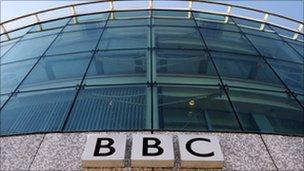Q&A: The end of the licence fee?
- Published

The licence fee generates around £3.5bn a year
A right-wing think tank says the television licence fee should be scrapped and replaced by a voluntary subscription service for some BBC programming - such as drama and entertainment.
The growing use of the internet for viewing has made licensing TV sets outdated, according to right-wing think tank the Adam Smith Institute.
But what does this mean for viewers?
Will the licence fee be scrapped?
Chris Curtis, deputy editor of media magazine Broadcast, doesn't think so.
"The report's findings are really radical, and probably done to promote debate and bring the issues into focus. It would be a very extreme change of circumstances. I don't think it's going to happen. There is no point in debating the practicalities.
"There is lots of anti-BBC sentiment in the commercial world but the public still have a residual love affair with the BBC," he adds.
But Andrew Pettie, TV and Radio editor at the Telegraph newspaper, isn't so sure.
"It's not necessarily the case that the removal of the licence fee would lead to decreased revenue for the BBC, as the corporation could go on to make more money abroad," he says.
He believes the BBC could increase its revenue with advertising overseas and access to the iPlayer for those living abroad.
Could the BBC really become the new Sky?
"It's a big jump from a reduced licence fee to a voluntary subscription," says Curtis.
"This report comes from a right-wing think tank - it holds Sky up as a model… Sky has been very successful and there is lots to admire about it but it couldn't be more different from the BBC," he adds.
"Criticising the BBC for not being Sky is like criticising football for not being chess."
What are the negatives of the proposed changes?
"The good thing about the licence fee is that, because it is collected from everyone, it doesn't have to be populist," says Pettie.
"The main danger of the subscription model is that it is under pressure to provide lots of different packages - that could mean the loss of lucrative things like Doctor Who and things on BBC Four, Radio 3 and Radio 4," he adds.
And the positives?
Pettie believes there are two main attractions.
"Collecting the licence fee from everyone is technically outdated since lots of people consume the BBC through different ways - i.e. on the PC," he says.
"And if you pay some form of subscription, you could have advertising. You could make revenue from abroad, promoting the BBC as a global brand - this could benefit viewers in Britain.
How would the plans compare with other models overseas?
Pettie concedes it could be difficult to replicate successful subscription schemes, such as HBO in the US.
"The UK is a relatively small country - with HBO, it delivers excellent high-end TV but the subscription works as there are enough people to pay for it. But if the same percentage took that up in the UK, it wouldn't be enough."
- Published2 August 2010